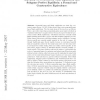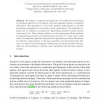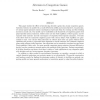9 search results - page 1 / 2 » A constructive approach to sequential Nash equilibria |
118
click to vote
MOR
2010
15 years 24 days ago
2010
We develop first-order smoothing techniques for saddle-point problems that arise in the Nash equilibria computation of sequential games. The crux of our work is a construction of ...
94
Voted
IPL
2006
15 years 2 months ago
2006
We present a Coq-formalised proof that all non-cooperative, sequential games have a Nash equilibrium point. Our proof methodology follows the style advocated by LCFstyle theorem p...
126
click to vote
CORR
2007
Springer
15 years 2 months ago
2007
Springer
Abstract. Sequential game and Nash equilibrium are basic key concepts in game theory. In 1953, Kuhn showed that every sequential game has a Nash equilibrium. The two main steps of ...
114
click to vote
WINE
2007
Springer
15 years 8 months ago
2007
Springer
We present a computational approach to the saddle-point formulation for the Nash equilibria of two-person, zero-sum sequential games of imperfect information. The algorithm is a �...
124
Voted
CORR
2008
Springer
15 years 2 months ago
2008
Springer
This paper studies the effects of introducing altruistic agents into atomic congestion games. Altruistic behavior is modeled by a trade-off between selfish and social objectives. ...



